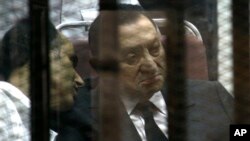In Tahrir Square Thursday, 21-year-old Shams al-Deen, a tour guide, stood in view of a crumbling building as construction workers demolished it. The building was the ruling party headquarters under ousted president Hosni Mubarak before protesters torched it in 2011.
It burned for days.
Al-Deen said the building should be destroyed not because it is a symbol of the old regime, but because it is old.
“It’s been so long since there was anything new for Egypt,” he said. “We want development.”
As symbols of the 2011 revolution fade, legal battles are in full swing. The court announced Thursday that Mubarak will be tried again on charges connected to the killing of protesters during the uprising.
After being convicted of conspiring to kill more than 200 protesters in 2012, Mubarak was originally sentenced to life in prison.
In 2014, however, the charges were dropped. Now, prosecutors have been granted a final chance for conviction beginning in November.
Prior to this announcement, Mubarak was expected to be freed any day, having already served a three-year sentence on corruption charges.
Mubarak’s 2014 acquittal was part of a larger problem, according to Sarah Leah Whitson, executive director of Human Rights Watch's Middle East and North Africa Division
“It really follows the pattern that we’ve seen of acquittals of Mubarak-era officials who have been charged with a variety of crimes,” she said.
“The worst of which, of course, were the mass killings of protesters during the uprising against Mubarak, but also corruption charges,” said Whitson.
Uneven justice
Meanwhile, the Muslim Brotherhood’s Mohamed Morsi, Mubarak’s successor and fellow ousted president, is possibly facing the death penalty after being convicted of conspiring with foreign militant groups to stage a mass prison break in 2011. Morsi has also been convicted of arresting and torturing protesters in 2012, and accused of fraud and leaking documents.
Thousands of other jailed Muslim Brotherhood supporters face harsh sentences, often after being tried in large groups.
For many Egyptians, the trials represent a blow to a powerful group that seeks to derail Egyptian development and the nation’s pluralistic values, according to Egyptian journalist Mohamed Tarek. “Any deal with the Muslim Brotherhood would bring the state back ten years,” he said.
However, the appearance of an anti-Islamist bias in the Egyptian courts angers not just Muslim Brotherhood supporters, but the liberal opposition as well, said Ziad Akl, a senior researcher at the Cairo-based Al-Ahram Center for Political and Strategic Studies.
“It’s having political repercussions in terms of creating some sort of middle ground [with] leftist and liberal opposition, who are also anti-Muslim Brotherhood,” he said. And they “are finding in the absence of legal rights and in the absence of independent, non-politicized, non-biased judiciary some form of middle ground between them and the Muslim Brotherhood.”
However, the appearance of bias in the courts, highlighted by the trial of the two presidents, is not necessarily proof of bias, said Egyptian publisher and editor Hisham Kassem. For example, he said, acquittals of Mubarak-era officials, and of Mubarak himself, were often for lack of evidence. And when Mubarak stepped down, he had 18 days of an uprising to cover his tracks.
“By the time he did it he left very little trace of his 30 years of corruption,” Kassem said. Morsi, he added, believed he would maintain his seat despite the protests and when he was arrested, left a trail of evidence against himself and his government.
Security issue
The government led by President Abdul Fattah al-Sisi does not distinguish between the Muslim Brotherhood and other Islamist groups that have killed hundreds of security officers in the Sinai Peninsula in attacks since Morsi was thrown out of office by the military after mass protests in 2013. The Muslim Brotherhood and the militant groups have all been deemed terrorist organizations.
Lumping all of these groups together, in addition to anti-terrorism laws that curb political rights, Akl said, is part of a systemic problem that allows extremism to grow.
“It’s not only a security problem,” he explained. “The kind of terrorism that Egypt is facing right now — and it is a problem, I’m not trying to undermine it. But I’m just saying that it's as much a problem of security measures, as it’s a problem of political consideration, as it’s a problem of legislative consideration, as it’s a problem of cultural and social consideration.”
On Wednesday, two police officers were killed near the pyramids in what appeared to be an attack on the tourism industry, a significant part of Egypt's income.
The presidential trials, however, are not directly related to the violence, according to Kassem. The prosecution of ousted leaders is part of a solution that may help Egypt build a less corrupt and freer country, he said.
“Putting heads of state on trial — now with Morsi and Mubarak — is giving two messages to people like Sisi and future presidents,” he added. “One: if you’re the president of the country, do not be corrupt. The second one is: When the people hit the streets, step down. That was Morsi’s mistake.”







